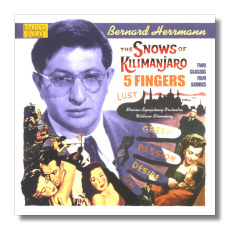
The Internet's Premier Classical Music Source
Related Links
- Herrmann Reviews
- Latest Reviews
- More Reviews
-
By Composer
-
Collections
DVD & Blu-ray
Books
Concert Reviews
Articles/Interviews
Software
Audio
Search Amazon
Recommended Links
Site News
 CD Review
CD Review
Bernard Herrmann

Film Scores
- The Snows of Kilimanjaro (1952)
- Five Fingers (1952)
Moscow Symphony Orchestra/William Stromberg
Marco Polo 8.225168 66:27
Summary for the Busy Executive: The score's the thing.
The program consists of Herrmann's scores to a piece of Fifties rumty-tum, The Snows of Kilimanjaro, and to the cult classic, Five Fingers. Not even Herrmann's dramatic sense – sharper than that of most Hollywood directors and screenwriters – could save Snows from big-budget bloat and self-importance, nor from the acting of its stars, a wooden Gregory Peck and Susan Hayward at her most annoyingly noble. The Hemingway story which provided the plot falls just short of such classics as "Hills Like White Elephants" (it edges right up to the sentimentality line), but it's not exactly chopped liver. Its effect depends heavily on Hemingway's capacity for revealing what characters don't say. At any rate, the score, while not quite at the level of the composer's best, is clearly the least sappy thing about the movie. It's as if Herrmann was the only one on the set to have read Hemingway. Although many know the "Memory Waltz" cue, probably f rom Herrmann's own recording, this CD presents all the cues for the first time.
John Morgan, Hollywood ace orchestrator, gets the credit for coming up with a workable score, although he worked from Herrmann's own manuscripts, miraculously preserved by the Fox studio. In some cases, Herrmann's notation was hard to read, and Morgan may have had to rework some of the cues to put them in comprehensible shape during the restoration work. Nevertheless, Marco Polo gives us the score pretty much as Herrmann wrote it.
Herrmann fans know the brooding, the disquiet, and the wit of his music pretty well. The Kilimanjaro score, however, may surprise some with its tenderness. The love scenes sing gorgeously, and with a sentiment that doesn't scream Technicolor or blare ersatz Wagner. One hears a good deal of regret and sadness in the music as well. Here, Herrmann captures the predominant note of the Hemingway story. The only false note in the score sounds with the bombastic final cue, but that's due primarily to the producers' insistence on a triumphal, feel-good ending for the script. Hemingway's hero dies, but you couldn't make a habit of killing off stars like Gregory Peck, although, to be fair, he did more than his share of death scenes. The film, as opposed to the original story, becomes a tale of Man Saved by the Love of a Good Woman, instead of a man who finds out just before he dies that he has royally messed up. Herrmann gives us the hokum ending the script demands. Fortunately, it's a short cue. The music works, as you would expect, beautifully in the film, but unlike many Herrmann scores, you may find listening to it for its own sweet sake a little difficult. The cues are mostly soft, slow, dreamy, and sad. The "Panic" cue, just before the "Finale," may make you start from a pleasant slumber.
With the score to Five Fingers, we find ourselves in familiar Herrmann territory – the world of the Hitchcock-Herrmann thrillers – but those pictures were a few years away. Five Fingers, written (actually, largely rewritten with no credit) and directed by Joseph Mankiewicz, gives us a foretaste of that world. The story concerns a British diplomat's valet (James Mason, in a terrific performance) who photographs sensitive material for the Nazis for the money. The story has almost no character you want to root for. The valet gets away with it… and doesn't get away with it, in an almost O. Henryish twist (rent this film!). The movie, obviously influenced by film noire, is nevertheless shot in a matter-of-fact, quasi-documentary style, a bit like Henry Hathaway's House on 92nd Street and Call Northside 777 in that way.
Herrmann's score gives us emotional meat on the bare-bones style. The valet, Cicero, betrays his country, he says, for money. Yet the music makes it clear that he also does it for kicks, for the adrenalin rush of the jeopardy he puts himself in. It's a beautiful example of how a great film score works together with a great film.
The score also has its share of in-jokes – perhaps a sideswipe at Max Steiner's Casablanca – as demented little bits of "God Save the King" and "Heart of Oak" flit through the embassy sequences. Far from arousing patriotism, they conjure up the image of Col. Blimp. Well, the film was made in 1952.
William Stromberg and his Muscovites do well enough, but in this recording the scores are the stars. Indeed, the Naxos/Marco Polo series of film music has brought back to light many worthy, little-known scores by all the heavy hitters of movie music, including Honegger, Ibert, and Shostakovich, as well as the denizens of the Hollywood pantheon.
Copyright © 2006, Steve Schwartz




















